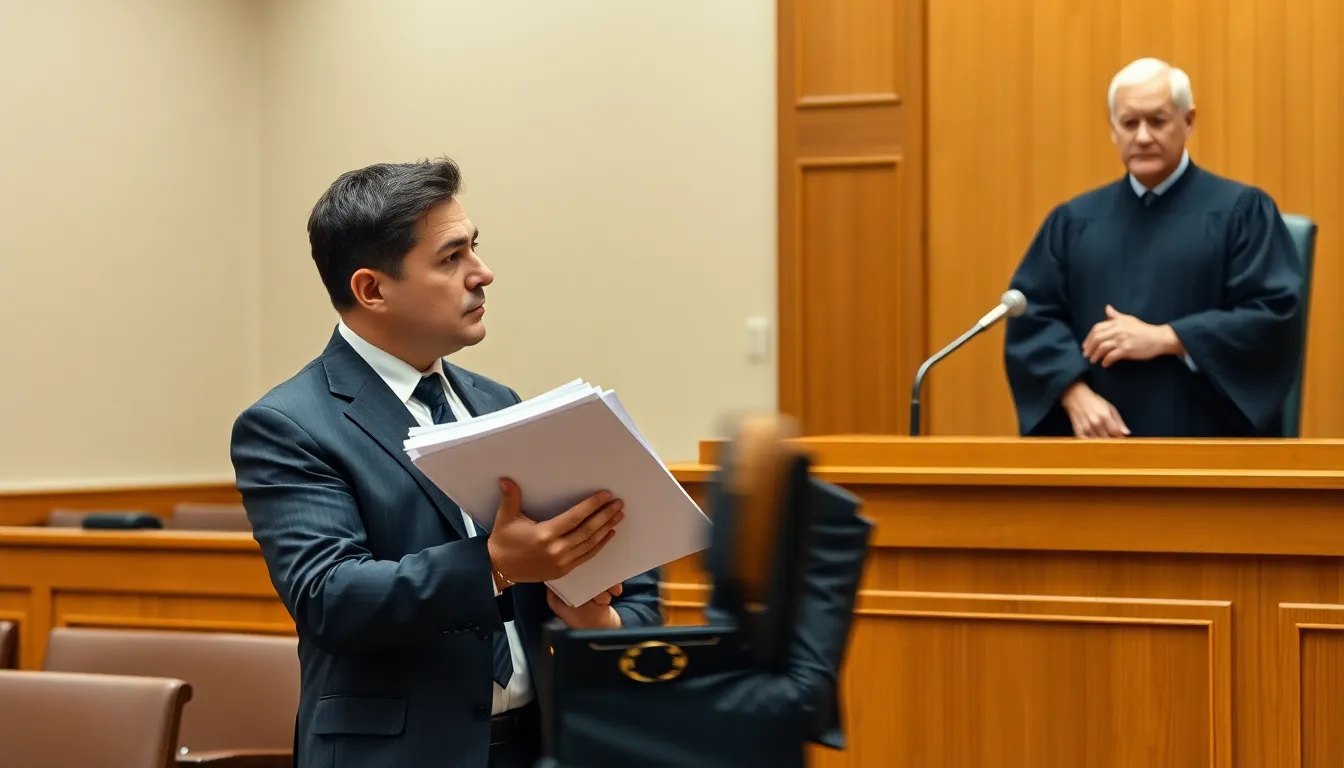Navigating the eviction process can feel like trying to find a needle in a haystack—while blindfolded. Whether you’re a landlord facing a reluctant tenant or a tenant facing an eviction notice, the stakes are high and the stress can be overwhelming. But don’t worry; there’s a light at the end of the tunnel, and it doesn’t involve a courtroom drama or a reality TV show.
Understanding the ins and outs of eviction can save you time, money, and maybe even your sanity. With the right advice, you can tackle this tricky process like a pro. So grab your coffee, take a deep breath, and get ready to dive into the essentials of eviction—where knowledge is your best ally and a little humor can go a long way.
Table of Contents
ToggleUnderstanding Eviction Process
Understanding the eviction process is crucial for both landlords and tenants. Familiarity with the steps involved helps alleviate confusion and anxiety during this challenging time.
What Is an Eviction?
An eviction is a legal process that a landlord initiates to remove a tenant from a rental property. A court order typically authorizes eviction after a landlord proves the tenant has violated lease terms. Non-payment of rent, lease violations, or unauthorized occupants often lead to these proceedings. After a judgment, law enforcement may enforce the eviction, ensuring the tenant vacates the property.
Common Reasons for Eviction
Common reasons for eviction include non-payment of rent, property damage, and violation of lease terms. An increase in rental rates or failure to maintain the property can also prompt eviction. Tenants often face eviction for engaging in illegal activities on the premises. Each reason carries specific legal ramifications that vary by state or locality. Understanding these causes equips landlords with the knowledge needed to handle potential evictions effectively.
The Steps of the Eviction Process

Understanding the steps of the eviction process helps landlords and tenants navigate the situation effectively. Each phase has specific requirements that must be adhered to.
Notice to Quit
Every eviction process begins with a notice to quit. This formal document informs the tenant of the landlord’s intent to terminate the rental agreement. Various states have different rules regarding the notice period, often ranging from 3 to 30 days. Identifying the correct type of notice is essential, as it can be a pay or quit notice or a notice for lease violations. Ensuring proper delivery to the tenant safeguards against potential legal challenges later.
Filing an Eviction Lawsuit
Filing an eviction lawsuit becomes necessary if the tenant does not comply with the notice. Landlords typically submit their complaint to the local court along with any required filing fees. Completed forms often include details about the lease and the reason for eviction. After submission, the court schedules a hearing date, notifying the tenant about the upcoming proceedings. Gathering evidence and documentation strengthens the landlord’s case and prepares them for the court hearing.
Court Hearing and Judgment
During the court hearing, both parties present their case before a judge. Presenting evidence, witness testimonies, and documentation can significantly influence the outcome. After reviewing all information, the judge issues a judgment, which can favor either the landlord or the tenant. If the judgment favors the landlord, the court may authorize eviction. Conversely, if the judgment supports the tenant, the eviction may be dismissed, allowing the tenant to remain in the property. Understanding the potential outcomes helps both parties manage expectations throughout the process.
Tenant Rights During Eviction
Tenants possess specific rights during the eviction process that protect them legally. Understanding these rights empowers them to navigate the situation effectively.
Rights to Contest the Eviction
Tenants can contest an eviction if they believe it lacks merit. Filing a legal response within the specified timeframe allows them to present their case in court. Evidence supporting their claims, such as payment records or correspondence with the landlord, can significantly strengthen their defense. Courts typically assess both sides before issuing a judgment, ensuring a fair hearing. The possibility of appeal exists for tenants who disagree with the court’s decision, offering another layer of protection.
Protection Against Retaliation
Tenants are protected against retaliation from landlords following complaints or legal actions. If a tenant reports health violations or raises concerns about unsafe conditions, a landlord cannot legally retaliate by initiating an eviction. Laws vary by state, so familiarization with local statutes is vital. Documentation of any retaliatory actions strengthens a tenant’s position in legal proceedings. Overall, tenants must remain aware of their rights to safeguard themselves against misuse of power in eviction situations.
Tips for Tenants Facing Eviction
Understanding the eviction process can ease the stress of facing possible eviction. Tenants can take specific steps to protect themselves and navigate the situation more effectively.
Documenting Communication
Maintain a record of all communications with the landlord. Note dates, times, and the nature of conversations. Written correspondence, such as emails or letters, provides evidence that can be crucial during disputes. Tenants should also keep copies of any notices received. Proper documentation strengthens their case, demonstrating proactive engagement.
Seeking Legal Assistance
Consulting a lawyer experienced in tenant rights significantly benefits tenants. Legal experts can clarify complex issues, including state-specific laws that protect tenant rights. They help create a strategy for contesting the eviction if warranted. Many communities offer legal aid services for individuals facing financial hardships. Accessing these resources ensures that tenants understand their options.
Exploring Alternative Solutions
Consider negotiating with the landlord to explore possible solutions. Open discussions might lead to payment plans or lease modifications. Mediation services are also available to facilitate constructive dialogue. Engaging in these alternative methods promotes collaboration and can prevent eviction altogether. Tenants should reach out early, as timely intervention often leads to better outcomes.
Advice for Landlords
Landlords face various challenges during the eviction process. Understanding legal requirements and maintaining clear communication with tenants can lead to smoother proceedings.
Proper Documentation and Procedures
Proper documentation ensures that landlords follow legal protocols during eviction. Collection of rental agreements, payment records, and notices remains essential for supporting cases in court. Each state mandates specific forms and timelines for notices. Failure to comply can lead to delays or case dismissal. Landlords should document all interactions with tenants meticulously, as these records can serve as important evidence later. Compliance with local laws not only enhances landlords’ chances of success but also protects them from potential legal repercussions.
Communicating with Tenants
Effective communication with tenants fosters a more manageable eviction process. Initiating conversations about late payments or issues early on often helps resolve problems amicably. Clear explanations about the eviction process and timelines can prevent misunderstandings. Encouraging open dialogue allows tenants to express their concerns and may lead to timely solutions, such as payment plans. Regular updates during the process also keep tenants informed, reducing anxiety on both sides. Prioritizing clear communication sets a foundation for resolving conflicts efficiently.
Navigating the eviction process can be daunting for both landlords and tenants. By understanding the legal steps involved and knowing their rights, individuals can approach this challenging situation with greater confidence. Effective communication and proper documentation play vital roles in minimizing conflict and ensuring a smoother experience.
Both parties should remain proactive and informed, seeking legal assistance when needed. Exploring alternative solutions can also foster better outcomes, allowing for negotiations that may prevent eviction altogether. With the right knowledge and approach, landlords and tenants can handle the eviction process more effectively, reducing stress and uncertainty.



